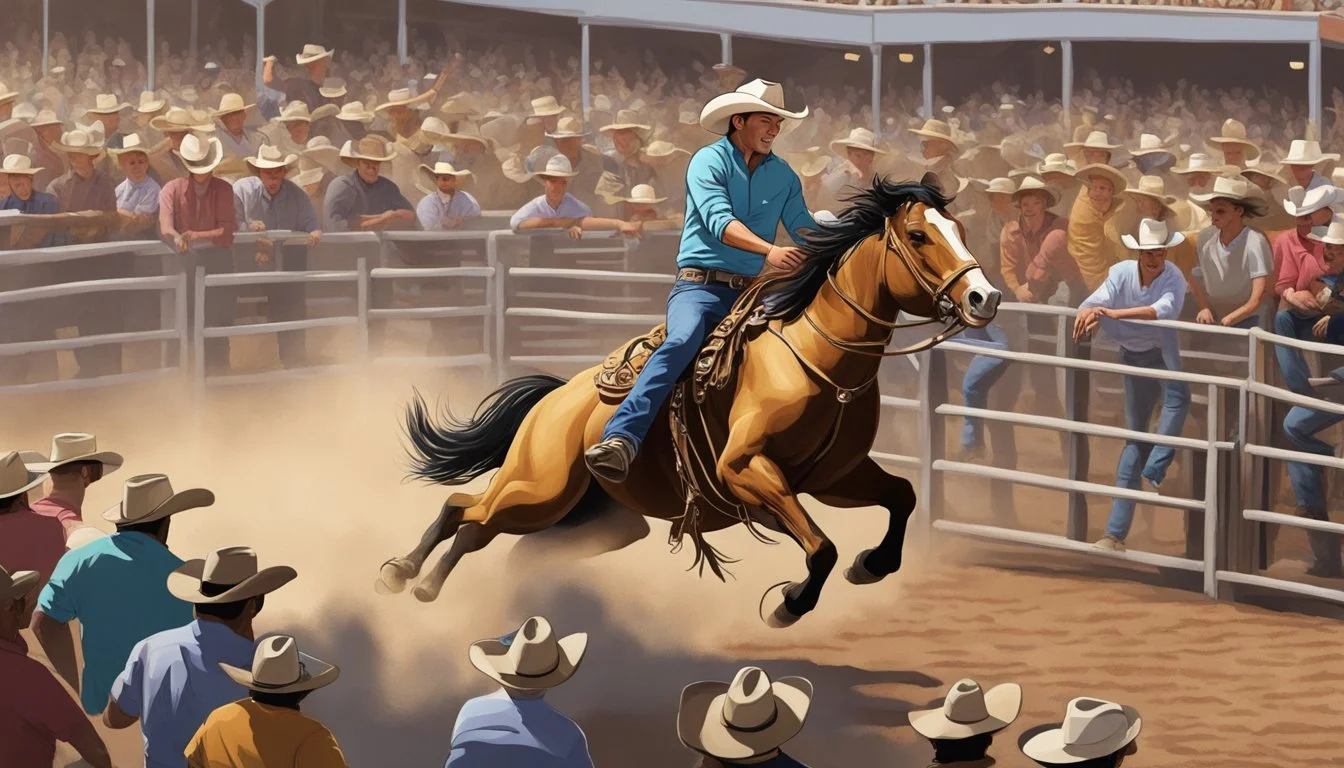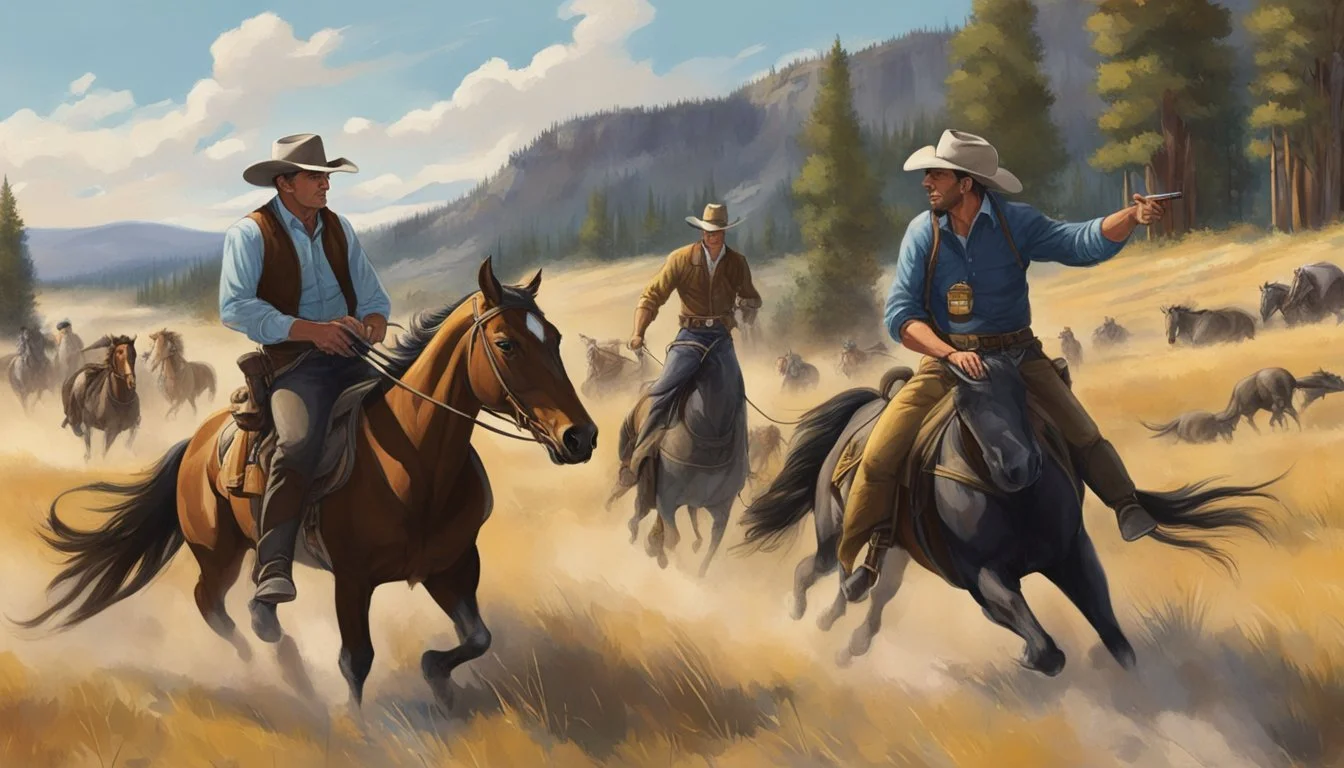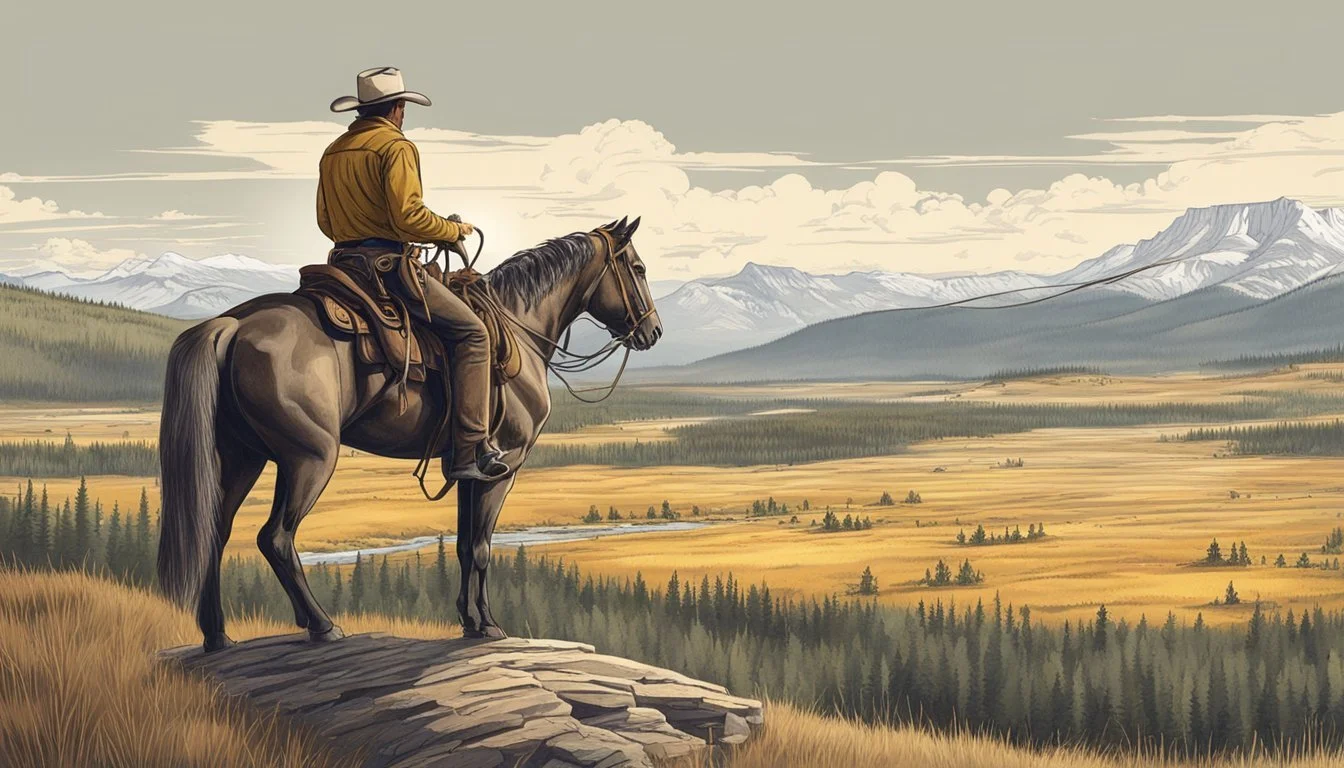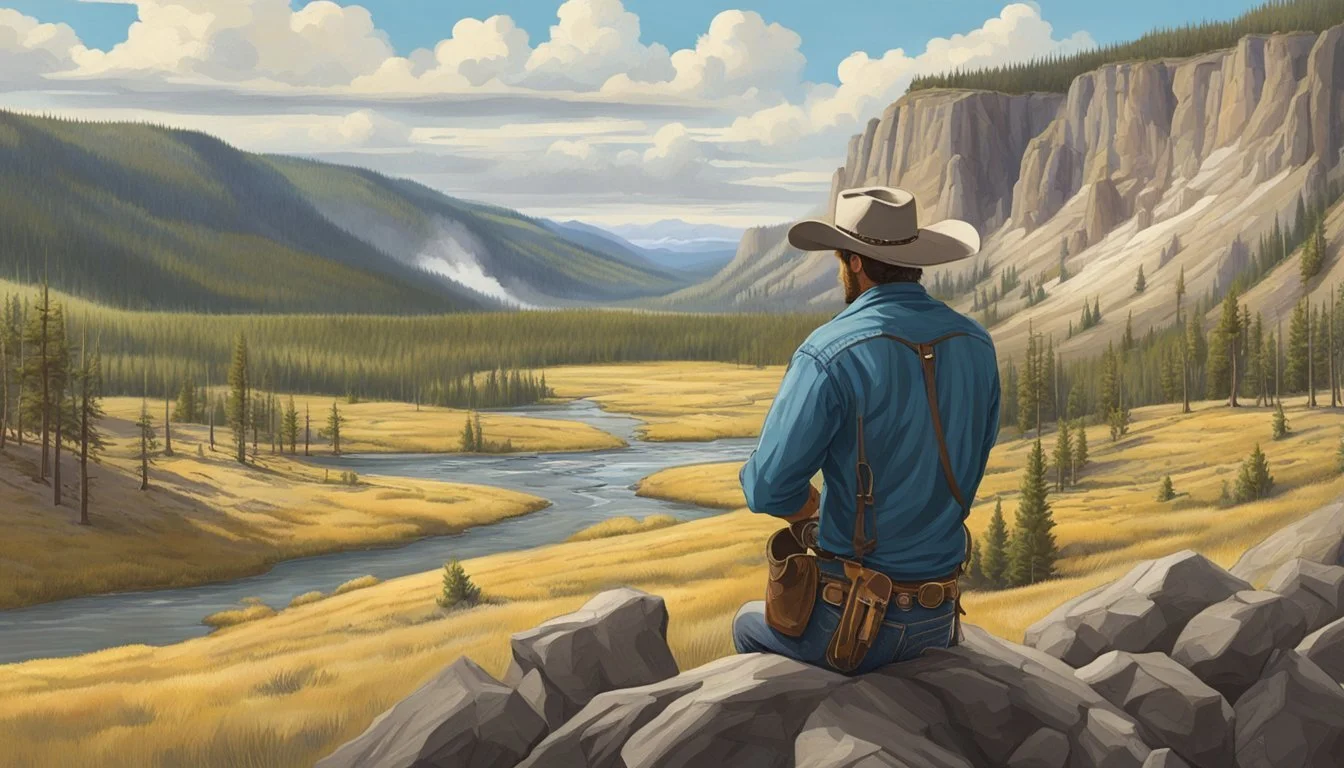Tate Dutton's Rodeo Dream: Will Yellowstone's Young Star Become a Champion?
Yellowstone's Tate Dutton has already faced his share of challenges on the hit TV series. Imagine the excitement if this young character followed in the footsteps of real-life rodeo stars featured on the show. Tate's journey from ranch kid to rodeo champion could add a thrilling new dimension to the Yellowstone saga.
The world of professional rodeo has deep ties to the Yellowstone region. Towns like Cody, Wyoming and West Yellowstone, Montana have hosted popular rodeo events for decades. These competitions showcase the skills essential to ranch life while drawing top talent from across the country.
Taylor Sheridan, Yellowstone's creator, has incorporated authentic rodeo elements into the series. Real champions have made appearances, lending credibility to the show's portrayal of Western culture. A storyline featuring Tate's rise through the rodeo ranks could tap into this rich tradition while exploring new dramatic territory for the character and the Dutton family.
Tate: From Dutton Ranch to Rodeo Stardom
Tate Dutton's journey from the Yellowstone Ranch to rodeo fame reflects his family's legacy and personal growth. His story intertwines with Montana's rich cowboy culture and the evolving dynamics of the Dutton clan.
Character Evolution and Background
Tate Dutton, son of Kayce and Monica, grew up on the Yellowstone Ranch, immersed in the world of cattle and horses. His mixed heritage, being part Native American and part rancher, shaped his unique perspective on life in Montana.
As a child, Tate faced numerous challenges, including a traumatic kidnapping. These experiences forged his resilience and determination. By Season 5 of Yellowstone, Tate had matured into a capable young man, ready to forge his own path.
Tate's upbringing on the ranch provided him with essential skills for rodeo success. His natural affinity for horses and livestock, honed through years of ranch work, became a solid foundation for his rodeo career.
The Significance of Rodeo in Tate's Life
Rodeo became more than just a sport for Tate; it represented a way to honor his family's legacy while carving out his own identity. The arena offered him a chance to showcase his skills and prove himself beyond the shadow of the Dutton name.
Tate's rodeo journey mirrored Montana's deep-rooted rodeo tradition. His success in events like calf roping and bronc riding brought pride to both sides of his heritage. It also served as a bridge between the ranching world and his Native American roots.
As Tate rose through the rodeo ranks, he became a symbol of the next generation of Duttons. His achievements in the arena added a new dimension to the family's influence in Montana, extending their legacy beyond land and cattle.
The Influence of the Dutton Family
The Dutton family's impact on Tate's potential rodeo career stems from their deep-rooted connection to the land and ranching lifestyle. Their values, experiences, and perspectives shape Tate's understanding of horsemanship and competition.
John Dutton's Philosophy
John Dutton's leadership of the Yellowstone Ranch instills a strong work ethic and determination in Tate. His grandfather's unwavering commitment to preserving their land and way of life serves as a powerful example. John's philosophy emphasizes resilience and adaptability, traits essential for success in the rodeo circuit.
These lessons prepare Tate for the physical and mental challenges of competitive riding. John's strategic thinking in ranch management also translates to developing effective rodeo strategies.
Kayce Dutton as a Role Model
Kayce's military background and ranching expertise make him an ideal mentor for Tate's rodeo aspirations. His father's skills in horsemanship and cattle handling provide a solid foundation for various rodeo events.
Kayce's calm demeanor under pressure teaches Tate valuable lessons in focus and composure. His ability to navigate dangerous situations on the ranch parallels the risks involved in rodeo competition.
Kayce's balanced approach to tradition and change could help Tate blend classic rodeo techniques with innovative strategies.
Monica and the Native American Perspective
Monica brings a unique cultural perspective to Tate's potential rodeo career. Her Broken Rock heritage offers insights into the spiritual connection between humans and horses, enriching Tate's approach to riding.
She emphasizes the importance of respect for animals and nature, aligning with the ethical treatment of rodeo livestock. Monica's resilience in facing challenges provides Tate with emotional strength for the competitive rodeo environment.
Her connection to Native American rodeo traditions could inspire Tate to incorporate elements of his heritage into his riding style, creating a distinctive presence in the arena.
Yellowstone Series and Spinoffs
The Yellowstone franchise has expanded into a sprawling universe, exploring different eras of the Dutton family saga. Taylor Sheridan's vision has brought multiple spinoffs to life, each delving into unique aspects of the Dutton legacy.
Taylor Sheridan's Vision
Taylor Sheridan, the creator of Yellowstone, has crafted a rich tapestry of interconnected stories. His ambitious plan includes several spinoff series that explore different time periods and branches of the Dutton family tree. Sheridan's approach blends historical drama with contemporary themes, creating a compelling narrative that spans generations.
The spinoffs complement the original Yellowstone series, offering viewers a deeper understanding of the Dutton dynasty. Each show maintains Sheridan's signature style of intense character development and stunning visuals of the American West.
1883 and Historical Foundations
1883 serves as a prequel to Yellowstone, chronicling the Dutton family's arduous journey across the American frontier. The series stars Tim McGraw, Faith Hill, and Sam Elliott, showcasing the hardships faced by the earliest Dutton settlers.
This spinoff provides crucial context for the Dutton's claim to their land, a central theme in Yellowstone. The show's portrayal of 19th-century life on the wagon trail offers a stark contrast to the modern-day struggles depicted in the main series.
1923 to Present: The Dutton Legacy
1923 continues the Dutton saga, focusing on a new generation facing the challenges of Prohibition and the Great Depression. Starring Harrison Ford and Helen Mirren, this series bridges the gap between 1883 and the present-day Yellowstone.
The franchise also includes plans for additional spinoffs set in various time periods. These include "6666," centered around the famous Texas ranch, and "The Madison," which will feature Michelle Pfeiffer and continue the story in the present day.
These spinoffs collectively paint a comprehensive picture of the Dutton family's evolution and their enduring connection to the land.
Rodeo Culture and Competition
Rodeo embodies the spirit of the American West, blending skill, tradition, and fierce competition. It demands intense dedication from participants while preserving a unique way of life rooted in ranching heritage.
Training and Discipline
Rodeo champions dedicate countless hours to honing their craft. Daily practices involve physical conditioning, mental preparation, and animal handling skills. Riders focus on balance, timing, and strength to master events like bull riding and bronc riding. Ropers spend hours perfecting their aim and speed.
Many aspiring rodeo stars start young, competing in junior events and working their way up. They often train on family ranches or at dedicated rodeo schools. Montana and Texas are home to some of the best training facilities in the country.
Discipline is key. Cowboys follow strict diets and exercise regimens to stay in peak condition. Mental toughness is equally important, as riders must overcome fear and stay focused in high-pressure situations.
Rodeo as a Way of Life
For many, rodeo is more than a sport - it's a lifestyle deeply connected to ranching culture. Cowboys often grow up on working cattle ranches, where daily tasks mirror rodeo events. Roping, riding, and animal handling are essential skills both in the arena and on the range.
Rodeo families travel extensively on the competition circuit, especially during summer months. This nomadic lifestyle creates tight-knit communities bound by shared experiences and values. Children often grow up immersed in rodeo culture, learning from parents and mentors.
The rodeo world celebrates Western heritage through its fashion, music, and traditions. Cowboy hats, boots, and belt buckles are worn with pride. Country music and cowboy poetry are integral parts of the culture.
Significant Relationships and Their Impact
Tate's journey to becoming a rodeo champion is significantly influenced by his relationships with key family members. These connections shape his character, skills, and motivations in profound ways.
Tate and Beth's Bond
Beth Dutton, Tate's aunt, plays a crucial role in his development. Her fierce protection and unconventional wisdom provide Tate with a unique perspective on life and the rodeo world. Beth's encouragement pushes Tate to embrace his inner strength and face challenges head-on.
Their bond grows stronger as Tate navigates the competitive rodeo circuit. Beth's business acumen helps Tate understand the financial aspects of professional rodeo, giving him an edge over his peers.
Beth's influence is evident in Tate's confident demeanor during high-pressure situations. Her unwavering support becomes a source of comfort and motivation for the young cowboy.
Rip's Influence and Mentoring
Rip Wheeler, Beth's husband and Tate's uncle by marriage, becomes a pivotal figure in Tate's rodeo journey. Rip's extensive ranch experience and no-nonsense approach to life shape Tate's work ethic and riding skills.
Under Rip's guidance, Tate hones his horsemanship and develops the physical and mental toughness required for rodeo success. Rip's lessons in perseverance and resilience prove invaluable as Tate faces the ups and downs of competition.
Their relationship evolves from mentor-mentee to a strong partnership. Rip's pride in Tate's achievements strengthens their bond, creating a father-son dynamic that complements Tate's relationship with his biological father.
Jamie's Complex Dynamic
Jamie Dutton's relationship with Tate adds a layer of complexity to the young rodeo star's journey. As Tate's uncle, Jamie's legal expertise becomes an asset in navigating contracts and sponsorships in the professional rodeo world.
However, Jamie's troubled history with the Dutton family creates tension. Tate must learn to balance his affection for his uncle with the family's complicated dynamics.
Jamie's attempts to support Tate's career are often met with skepticism from other family members. This forces Tate to develop diplomatic skills and make difficult choices about loyalty and trust.
Despite the challenges, Jamie's influence contributes to Tate's maturity and understanding of the world beyond the ranch and rodeo arena.
Drama and Conflict
Tate's potential rise as a rodeo champion would intensify existing tensions within the Dutton family and attract new threats to their legacy. His success could become a focal point for power struggles and external challenges.
Family Tensions and Power Struggles
Tate's rodeo ambitions might clash with John Dutton's vision for the ranch's future. John could see Tate's focus on rodeo as a distraction from learning to manage Yellowstone. This conflict could strain their relationship and force Tate to choose between his passion and family duty.
Beth might support Tate's dreams, seeing them as a way to secure his future outside the ranch. This could put her at odds with her father and brothers. Kayce might feel torn between supporting his son and maintaining family unity.
The possibility of Tate becoming a public figure through rodeo success could worry the family. They might fear increased scrutiny of their affairs and potential exposure of secrets.
External Threats to the Dutton Legacy
Tate's rodeo success could attract new enemies to the Duttons. Rival ranchers or business interests might try to exploit Tate's newfound fame to gain leverage against the family. They could attempt to use Tate as a pawn in their schemes to acquire Yellowstone land.
Thomas Rainwater might see Tate's Native American heritage as an opportunity to sway public opinion. He could try to position Tate as a symbol of indigenous rights, complicating the Duttons' land claims.
Tate's earnings and potential sponsorships could become a target for those seeking to challenge the Duttons financially. Concerns about inheritance tax might arise, forcing the family to reconsider their estate planning.
Media attention on Tate could expose the family to unwanted investigations. This might lead to revelations about past actions, threatening the Duttons' control over their empire.
Themes and Motifs
Tate's journey to becoming a rodeo champion intertwines with deeper themes of family legacy and connection to the land. His story reflects broader motifs present throughout the Yellowstone series.
Survival and Resilience
Tate's pursuit of rodeo success embodies the Dutton family's resilient spirit. He faces physical and mental challenges in the arena, mirroring the struggles his family endures to keep their ranch. The young rider's determination echoes Montana's rugged individualism.
Rodeo competitions test Tate's strength and skill, much like the trials his ancestors faced settling the West. His ability to stay on a bucking bronco symbolizes the Duttons' resolve to hold onto their land against mounting pressures.
The arena becomes Tate's proving ground, where he must overcome fear and pain. This mirrors the family's constant fight against threats to their way of life.
Land and Inheritance
Tate's rodeo aspirations connect him to the ranch's cowboy heritage. His success in the sport reinforces the Duttons' ties to their ancestral lands. The young champion becomes a living link between past and present.
Rodeo winnings could help secure the ranch's future, offering a new way to protect the family's legacy. This addresses the looming specter of inheritance taxes that threaten large landholdings.
Tate's Native American heritage adds depth to his relationship with the land. His rodeo pursuits blend cowboy culture with indigenous traditions, creating a unique identity.
The prophecy of Tate as a bridge between two worlds gains new meaning through his rodeo career. He embodies both the ranching lifestyle and his Broken Rock roots.
Yellowstone's Cultural and Social Impact
Yellowstone has profoundly shaped modern Western representation and Native American narratives in popular culture. The show's widespread appeal has sparked conversations about rural American life and indigenous issues.
Modern Western Representation
Yellowstone revitalized the Western genre for contemporary audiences. The series portrays ranching culture with a mix of tradition and modernity, resonating with viewers across the U.S. Its depiction of vast Montana landscapes has boosted tourism to the region.
The show's fashion choices have influenced real-world trends, with demand for Western-style clothing increasing. Yellowstone merchandise has become popular, further extending the show's cultural reach.
Paramount Network's hit series has also impacted discussions about land use, conservation, and rural economic challenges. It has brought these issues to the forefront of public discourse.
Native American Narratives
Yellowstone incorporates complex Native American characters and storylines, offering a nuanced portrayal of indigenous experiences. The show features the fictional Broken Rock Reservation and explores tensions between tribal interests and those of ranchers and developers.
Chief Thomas Rainwater's character provides insight into modern Native American leadership and political maneuvering. This representation has sparked discussions about sovereignty and land rights.
The series highlights the ongoing struggles of Native communities while also showcasing their resilience and cultural pride. It has increased awareness of indigenous issues among its diverse viewership.
The Future of Yellowstone and Its Characters
Yellowstone's future holds exciting possibilities for its characters and storylines. The show's creators have hinted at potential developments that could reshape the Dutton family saga.
Speculations on Upcoming Seasons
The final episode of Yellowstone's current season left several plot threads open. John Dutton's political career may face new challenges, while Beth's business dealings could take unexpected turns. Kayce and Monica's relationship might evolve as they navigate parenthood and tribal politics.
Rip Wheeler's loyalty to the Dutton family could be tested in future seasons. The ranch's operations may adapt to changing economic and environmental pressures. Jamie's complex relationship with his adoptive family might reach a critical point.
Potential for New Storylines and Spinoffs
Yellowstone's success has paved the way for potential spinoffs. A Beth and Rip spinoff could explore their dynamic relationship outside the ranch setting. The show might delve deeper into the Dutton family tree, examining past generations and their impact on the present.
The '6666' spinoff could feature familiar characters in a new Texas setting. This expansion of the Yellowstone universe might introduce fresh conflicts and alliances. The series could explore themes of legacy, land preservation, and the evolving American West.
New storylines might focus on Tate's coming of age and his role in the family's future. The show could also explore the broader impact of the Duttons on Montana's political and economic landscape.









